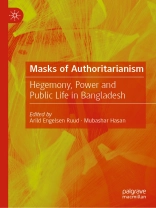This edited book investigates how life is affected by the increasingly authoritarian regime in Bangladesh.Earlier a flawed but real electoral democracy, over the last several years Bangladesh has been characterised as a ‘hybrid regime’ in The Economist’s Democracy Index. Today it is a country in which law still rules and leaders are still chosen – but only on paper. The uniqueness of this book is not in defining regime type or investigating trajectories. It is in its efforts to study how these changes affect everyday life. All chapters are based on intimate knowledge of a field, on first-hand experience, and on interviews and ethnography. This book will interest political scientists and scholars of Bangladesh, the Islamic world and beyond, with findings of broad relevance to hybrid regimes.
Inhaltsverzeichnis
Chapter 1. Introduction.- Part I. The media.- Chapter 2. The everyday politics of rumours and information: local journalism and social media in an authoritarian party-state regime in Bangladesh.- Chapter 3. Working Under the ‘Sword of Damocles’: Experiences of Journalists in a Hybrid Regime.- Part II. Alternative voices – three snapshots.- Chapter 4. The Rebels and the Conformers: Competing Patterns in Bangladeshi Rap Music.- Chapter 5. Life in a Hybrid Regime: Everyday struggles of gay men in Bangladesh.- Chapter 6. Targeted by Militants and Abandoned by the State: The Case of Shuddhashar Publication House.- Part III. The intellectuals.- Chapter 7. Manufacturing Consent, Silencing Dissent: The Case of Academic Freedom in Bangladesh.- Chapter 8. Making Cinema within Authoritarian Codes: The Case of Bangladesh.- Part IV. The unengaged – three snapshots.- Chapter 9. Are mega ‘development’ projects inherently undemocratic?: Field narratives from the projects sites.- Chapter 10. Everyday life in a hybrid regime: The case of health sector in Bangladesh.- Chapter 11. In the borderland: Everyday coping among Rohingya refugees.- Part V. The Political Stratum.- Chapter 12. The win-win game in politics: A study of the student wing of the ruling party in Bangladesh.- Chapter 13. Life of Jamaat e Islami and Its Political Allies in a Hybrid Regime.- Chapter 14. ‘If I am arrested, who will I do politics for?’ Repression and resistance at the base of the Bangladesh Nationalist Party.- Chapter 15. Afterword.
Über den Autor
Arild Engelsen Ruud is Professor and Head of Research, Department of Culture Studies and Oriental Languages, at the University of Oslo, Norway. Recently, he is co-author of Mafia Raj: the Rule of Bossism in South Asia (Stanford UP 2018) and co-editor of South Asian Sovereignty: the Conundrum of Wordly Power (Routledge 2019) and Outrage: the Rise of Religious Offence in South Asia (UCL Press 2019). He is author of several books both in English and in Norwegian on South Asian history and politics, including democratic practice.
Mubashar Hasan Ph D is an Adjunct Research Fellow at the Humanitarian and Development Research Initiative, Western Sydney University, Australia. He is the author of Islam and Politics in Bangladesh: The Followers of Ummah (Palgrave Macmillan, 2020), and the lead editor of the book Radicalization in South Asia: Context, Trajectories and Implications (Sage, 2020). Previously he was a post-doctoral fellow at Oslo University, Norway. He taught political science in North South University and Journalism in University of Liberal Arts Bangladesh.












